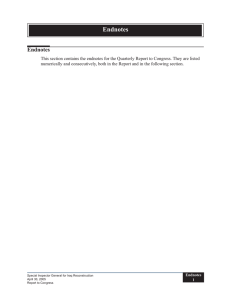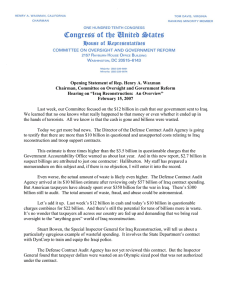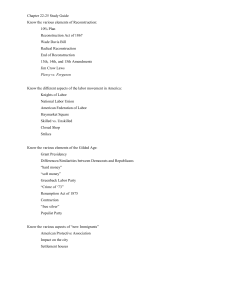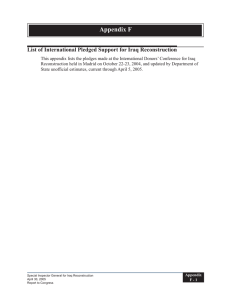Appendix H Audit Plan (2005-2006).
advertisement
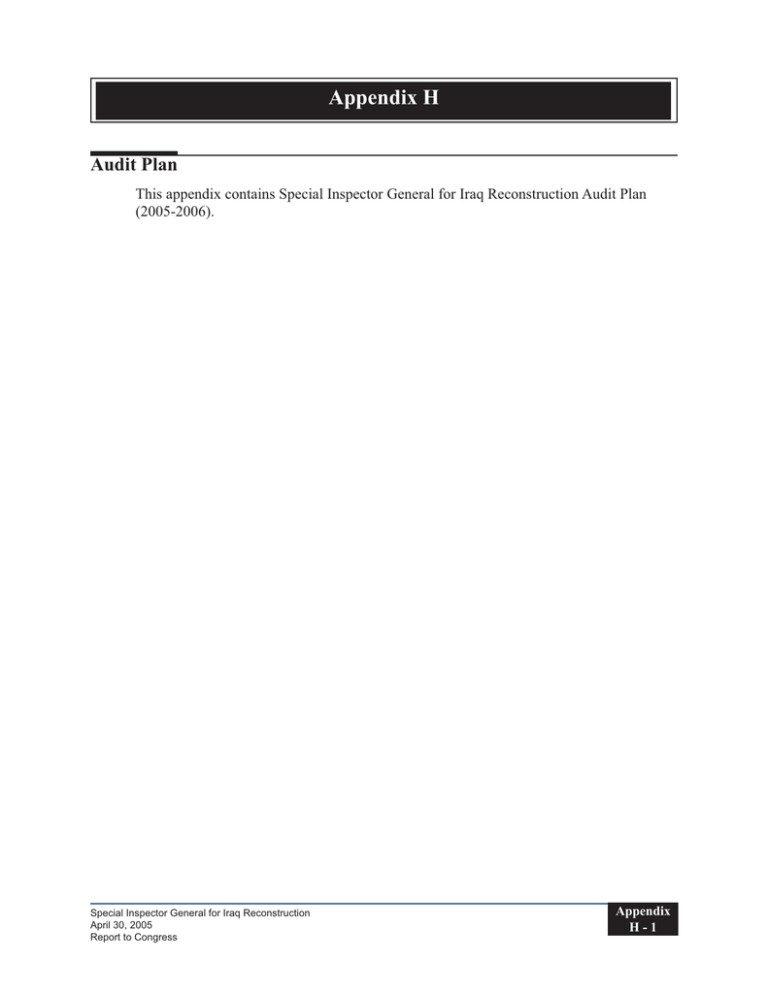
Appendix H Audit Plan This appendix contains Special Inspector General for Iraq Reconstruction Audit Plan (2005-2006). Special Inspector General for Iraq Reconstruction April 30, 2005 Report to Congress Appendix H-1 Appendix H-2 Special Inspector General for Iraq Reconstruction April 30, 2005 Report to Congress OFFICE OF THE SPECIAL INSPECTOR G ENERAL FOR IRAQ RECONSTRUCTION (SIGIR) AUDIT PLAN 22000055--22000066 Special Inspector General for Iraq Reconstruction April 30, 2005 Report to Congress Appendix H-3 IIN NTTRRO OD DU UCCTTIIO ON N This audit plan outlines the top priorities and the particular areas of interest of the Special Inspector General for Iraq Reconstruction (SIGIR) and describes the focus for the audits and evaluations to be performed during 2005-2006. The plan is to be used as a guide and is subject to revision owing to changing circumstances that may occur in Iraq and new or revised legislation. The SIGIR mission is derived from Public Law 108-106, Section 3001, which was passed in November 2003 and amended in October 2004 by Public Law 108-375. It mandates that SIGIR provide independent oversight of the $18.4 billion Iraq Relief and Reconstruction Fund (IRRF) authorized in supplemental appropriations contained in Public Law 108-106 (as amended). This plan is based on the requirements of Public Law 108-106 (as amended). It incorporates significant research into key areas of interest of management, SIGIR, and the Congress and provides balanced coverage of the SIGIR mission area with the resources currently and projected to be available. Special attention was been given to the unique nature of the Iraq reconstruction effort and SIGIR, the short life-span of SIGIR, and the resulting need for immediate and non-traditional approaches uniquely designed to address Iraq reconstruction programs and operations. Further, SIGIR incorporated its own on-the-ground knowledge of IRRF programs and operations, as well as hotline allegations and investigative referrals, to round out the basis for the key areas of interest described in the audit plan. SIGIR will primarily conduct performance audits that assess the economy, efficiency, effectiveness, and results of Iraq reconstruction programs and operations. Audit objectives may include assessing: Appendix H-4 the extent to which legislative, regulatory, or organizational goals and objectives are being achieved; the relative ability of alternative approaches to yield better program performance or eliminate factors that inhibit program effectives; the relative cost and benefits or cost effectiveness of programs; whether a program produced intended results or produced effects that were not intended by the program’s objectives; the extent to which programs duplicate, overlap, or conflict with other related programs; whether the audited entity is following sound procurement practices; Special Inspector General for Iraq Reconstruction April 30, 2005 Report to Congress the validity and reliability of performance measures concerning program effectiveness and results, or economy and efficiency; and the existence, reliability, validity, or relevance of financial information related to the performance of a program. Public Law 108-106 (as amended) requires the SIGIR to report to the Secretary of State and the Secretary of Defense. To that end, the SIGIR fosters communication with key stakeholders within the Department of State, the Department of Defense, the Department of Treasury, the Department of the Army, and the Administrator, U.S. Agency for International Development. Key stakeholders within the Department of State include the Secretary and Deputy Secretary of State; the Chief of Mission, U.S. Embassy, Iraq; and the Director, Iraq Reconstruction Management Office. Key stakeholders within the Department of Defense include the Secretary and Deputy Secretary of Defense; the Secretary of the Army; Chief of Engineers and Commanding General, U.S. Army Corps of Engineers; the Director, Defense Support Office – Iraq; and the Director, Project and Contracting Office. Further, SIGIR communicates with 26 committees and subcommittees of Congress that have a high level of interest in Iraq reconstruction efforts. SIGIR is keenly aware of high priority concerns of these stakeholders, and those factors are taken into consideration in the development of this plan. Due to the multi-agency nature of Iraq reconstruction efforts, SIGIR continues to consult and coordinate with its counterparts to include the U.S. Government Accountability Office; the Office of the Inspector General, Department of State; the Office of the Inspector General, Department of Defense; the Office of the Inspector General, Department of Treasury; the Office of the Inspector General, U.S. Agency for International Development; the Defense Contract Audit Agency; the U.S. Army Audit Agency; the Naval Audit Service; and the Air Force Audit Agency to minimize duplicative work. For a summary of on-going audits, see the SIGIR Quarterly Reports to Congress which are posted on our website at (www.iraqreconstructionig.org.) Stuart W. Bowen, Jr. Inspector General Special Inspector General for Iraq Reconstruction April 30, 2005 Report to Congress Appendix H-5 TTA OFF CCO ABBLLEE O ON NTTEEN NTTSS Introduction i Legislative Mandate 1 Overall Audit Plan Objectives 2 Audit Projects 3 Overview of Audit Plan Objectives for Performance Audit Projects Information Systems Used for the Management of Iraq Relief and Reconstruction Fund Programs 5 Policies and Procedures Used for Iraq Relief and Reconstruction Fund Project Management 5 Recruiting and Deployment of Project Management and Contracting Personnel Supporting Iraq Reconstruction 5 Iraq Reconstruction Records Management 5 Audit Series Overview of Audit Plan Objectives for Performance Audit Series 6 7 Reconstruction Activities Audits (Secure Sites) 8 Reconstruction Activities Audits (Non-Secure Sites) 8 Requirements Audits (Construction and Non-Construction) 10 Stabilization and Reconstruction Deployment Package Audits 10 Logistics Management Audits 11 12 13 Evaluations Overview of Audit Plan Objectives for Evaluations Evaluation of Specified Issues Concerning Iraq Relief and Reconstruction Fund Project Management 14 Evaluation of Specified Issues Concerning Transportation Support to Iraq Reconstruction 15 Coordination Appendix H-6 4 16 Special Inspector General for Iraq Reconstruction April 30, 2005 Report to Congress LLEEGGIISSLLAATTIIVVEE M MAANNDDAATTEE Pertinent excerpts from Public Law 108-106 (as amended) are noted below. SIGIR Mission (P.L. 108-106 as amended) (a) (1) To provide for the independent and objective conduct and supervision of audits and investigations relating to the programs and operations funded with amounts appropriated or otherwise made available to the Iraq Relief and Reconstruction Fund. (a) (2) To provide for the independent and objective leadership and coordination of, and recommendations on, policies designed to— (A) promote economy, efficiency, and effectiveness in the administration of such programs and operations; and (B) prevent and detect waste, fraud, and abuse in such programs and operations. (a) (3) To provide for an independent and objective means of keeping the Secretary of State and the Secretary of Defense fully and currently informed about problems and deficiencies relating to the administration of such programs and operations and the necessity for and progress for corrective action. SIGIR Audit Duties (P.L. 108-106 as amended) (f) (1) It shall be the duty of the Inspector General to conduct, supervise, and coordinate audits and investigations of the treatment, handling, and expenditure of amounts appropriated or otherwise made available to the Iraq Relief and Reconstruction Fund, and of the programs, operations, and contracts carried out utilizing such funds . . . . (f) (2) The Inspector General shall establish, maintain, and oversee such systems, procedures, and controls as the Inspector General considers appropriate to discharge the duty under paragraph (1). Special Inspector General for Iraq Reconstruction April 30, 2005 Report to Congress Appendix H-7 O OVVEERRAALLLL A AUUDDIITT PPLLAANN O OBBJJEECCTTIIVVEESS The overall audit plan objectives include: the oversight and accounting of the obligation and expenditure of IRRF funds the monitoring and review of reconstruction activities funded by the IRRF the monitoring and review of contracts funded by the IRRF the monitoring and review of the transfer of IRRF funds and associated information between and among departments, agencies, and entities of the United States, and private and nongovernmental entities the maintenance of records on the use of IRRF funds to facilitate future audits and investigations of the use of such funds Examples of Key Audit and Evaluation Areas of Interest Issues Key Evaluation s Specified Issues Concerning IRRF (such as Security, Insurance Transportation, and Iraqi Employment) IRRF Execution Key Audit Projects Information Systems Policies and Procedures Recruiting and Deployment Records Management Appendix H-8 Execution Key Audit Series Reconstruction Activities Requirements Determination Stabilization – Reconstruction Special Inspector General for Iraq Reconstruction April 30, 2005 Report to Congress PERFORMANCE AUDIT PROJECTS Special Inspector General for Iraq Reconstruction April 30, 2005 Report to Congress Appendix H-9 Appendix H - 10 Special Inspector General for Iraq Reconstruction April 30, 2005 Report to Congress Iraq Reconstruction Records Management Recruiting and Deployment of Project Management and Contracting Personnel Supporting Iraq Reconstruction Policies and Procedures Used for IRRF Project Management Information Systems Used for the Management of IRRF Programs AUDIT PROJECTS X X X Oversight and Accounting of the Obligation and Expenditure of IRRF Funds X X X Monitoring and Review of Reconstruction Activities Funded by the IRRF X X X X X AUDIT PLAN OBJECTIVES Monitoring and Monitoring and Review of Review of the Transfer of IRRF Contracts Funds and Associated Funded by the Information Between and IRRF Among Departments, Agencies, and Entities of the U.S. and Private and Nongovernmental Entities FUNDS APPROPRIATED OR OTHERWISE MADE AVAILABLE TO THE IRAQ RELIEF AND RECONSTRUCTION FUND OVERVIEW OF AUDIT PLAN OBJECTIVES FOR PERFORMANCE AUDIT PROJECTS X X Maintenance of Records on the Use of IRRF Funds to Facilitate Future Audits and Investigations on the Use of Such Funds AUDIT PROJECTS Information Systems Used for the Management of Iraq Relief and Reconstruction Fund Programs. The objective of this audit is to determine whether information systems used by U.S. government organizations result in the effective management of IRRF programs. In addition, we will determine whether those information systems used by U.S. government organizations were adequately reliable and sufficiently coordinated among those organizations to ensure accurate, complete, and timely reporting to senior government officials and the Congress on the use of IRRF funds. Policies and Procedures Used for Iraq Relief and Reconstruction Fund Project Management. The objective of this audit is to determine whether policies, procedures, and internal controls established by U.S. government organizations result in the effective management of Iraq reconstruction projects. In addition, we will determine whether those policies, procedures, and internal controls were adequately coordinated by and among U.S. government organizations and resulted in sufficient consistency among those organizations for the effective management and timely completion of Iraq reconstruction projects. Recruiting and Deployment of Project Management and Contracting Personnel Supporting Iraq Reconstruction. The overall objective is to determine whether U.S. government organization’s recruitment and deployment processes for qualified project management and contracting staff supporting Iraq reconstruction is effective. Specifically, the audit will evaluate the effectiveness of legislative and regulatory guidance and processes used to identify personnel requirements, the methods to recruit and retain the personnel, and the procedures to measure recruitment and retention success. Iraq Reconstruction Records Management. The objective of this audit is to determine whether U.S. organizations have established adequate requirements, systems, and processes to manage and maintain records to facilitate future audits and investigations of the identification and use of IRRF funds. Special Inspector General for Iraq Reconstruction April 30, 2005 Report to Congress Appendix H - 11 PERFORMANCE AUDIT SERIES Appendix H - 12 Special Inspector General for Iraq Reconstruction April 30, 2005 Report to Congress Special Inspector General for Iraq Reconstruction April 30, 2005 Report to Congress Appendix H - 13 Logistics Management Audits Stabilization and Reconstruction Deployment Package Audits Requirements Audits (Construction and NonConstruction) Reconstruction Activities Audits (Non-Secure Sites) Audit Surveillance Reports (Construction) Audit Surveillance Reports (NonConstruction) Internal Control Reports (Construction and Non-Construction) Reconstruction Activities Audits (Secure Sites) AUDIT SERIES X X X X Oversight and Accounting of the Obligation and Expenditure of IRRF Funds X X X X X Monitoring and Review of Reconstruction Activities Funded by the IRRF X X X X AUDIT PLAN OBJECTIVES Monitoring and Monitoring and Review of Review of the Transfer of IRRF Contracts Funds and Associated Funded by the Information Between and IRRF Among Departments, Agencies, and Entities of the U.S. and Private and Nongovernmental Entities FUNDS APPROPRIATED OR OTHERWISE MADE AVAILABLE TO THE IRAQ RELIEF AND RECONSTRUCTION FUND OVERVIEW OF AUDIT PLAN OBJECTIVES FOR PERFORMANCE AUDIT SERIES X Maintenance of Records on the Use of IRRF Funds to Facilitate Future Audits and Investigations on the Use of Such Funds AUDIT SERIES Reconstruction Activities Audits (Secure Sites). The overall approach of this series of audits will be to assess the management of selected phases of construction and nonconstruction projects. These audits will be performed with a wide variety of specific audit objectives. These audits will be planned with a comprehensive scope and will entail a systematic examination of evidence to provide an assessment of the overall performance and management of construction and non-construction projects. In addition to the general legislative and regulatory guidance concerning contract administration and financial management, these audits will use the contract and task order provisions (e.g. such as the statement of work and/or the definitization of work tasked) as more specific criteria to identify the scope and assess the completion of projects. This particular type of audit will be performed at selected construction and non-construction sites for which the security is sufficiently adequate to allow SIGIR staff to conduct site-visits. As trends are observed and overarching themes emerge, a summary audit report may be considered to combine individual audit report results and recommendations and to address overall program management issues. Reconstruction Activities Audits (Non-Secure Sites). The overall approach of this series of audits will be to assess selected phases of construction and non-construction projects at specific points-in-time. These audits will be performed with a narrow range of specific audit objectives. These audits will be planned with a limited scope and will entail an examination of limited evidence to provide an assessment of the performance and management of construction and non-construction projects at specific points-in-time during the project life. These audits will use the contract and task order provisions and project monitoring information as more specific criteria to assess the completion of projects. This particular type of audit will be performed for selected construction and non-construction projects for which the security is not sufficiently adequate to allow SIGIR staff to conduct sitevisits. This approach will generally result in abbreviated and quick turnaround audit reports issued through a rapid assessment of point-in-time information. The reports will be identified as audit surveillance and internal control reports. Appendix H - 14 Special Inspector General for Iraq Reconstruction April 30, 2005 Report to Congress Audit Surveillance Reports (Construction). This particular type of audit will be performed for selected construction projects for which the security is not sufficiently adequate to allow project management staff to conduct site-visits. These audits will generally address current but perishable point-in-time information on construction projects in progress to measure completion status against project management goals and data. This information will be obtained by on-site observations of project status through non-traditional means other than SIGIR staff site-visits but will be tasked and evaluated by SIGIR auditors and technical subject-matter-experts. For example, one non-traditional method will include evaluation of digital and/or aerial surveillance of selected construction projects. Audit Surveillance Reports (Non-Construction). This particular type of audit will be performed for selected non-construction projects for which the security is not sufficiently adequate to allow project management staff to conduct site-visits. These audits will generally address current but perishable point-in-time information on nonconstruction projects in progress to measure completion status against project management goals and data. This information will be obtained by on-site observations of project status through non-traditional means other than SIGIR staff site-visits but will be tasked and evaluated by SIGIR auditors and technical subject-matter-experts. Some examples of non-construction include training for Iraqi armed forces, police, first responders, and health workers. Other examples include democracy building programs, public education programs, and private sector employment development programs. Internal Controls Reports (Construction and Non-Construction). This particular type of audit will be performed for selected construction and non-construction projects for which the security is not sufficiently adequate to allow project management staff to conduct site-visits. These audits will examine the internal controls and systems put in place by project managers for measuring, reporting, and monitoring project performance and evaluate the use of those internal controls and systems. These audits will entail a more systematic examination of evidence than the surveillance audits and may be performed in combination with our audit surveillance techniques. These audits will provide an assessment of the performance and management of construction and nonconstruction projects but with a more limited scope than the Reconstruction Activities (Secure Sites) type of audit. As trends are observed and overarching themes emerge, a summary audit report may be considered to combine individual audit report results and recommendations and to address overall program management issues. Special Inspector General for Iraq Reconstruction April 30, 2005 Report to Congress Appendix H - 15 Requirements Audits (Construction and Non-Construction). The overall approach of this series of audits will be to assess the overall planning and requirements determination for the initiation of future construction and non-construction projects. These audits will be performed with a wide variety of specific audit objectives. These audits will entail a systematic examination of evidence to assess how requirements for future construction and non-construction projects are defined and the policies, procedures, and systems used to plan for the prioritization and use of IRRF funds remaining to be obligated. In addition to the general legislative and regulatory guidance, these audits will use acquisition guidance as more specific criteria. As trends are observed and overarching themes emerge, a summary audit report may be considered to combine individual audit report results and recommendations and to address overall program management issues. Stabilization and Reconstruction Deployment Package Audits. The overall goal of this series of audits will be to assess core business processes and subsequently identify minimum-requirements approaches for specific functional areas that can ensure continuity, economy, efficiency, effectiveness, and program results for the current and future program management of endeavors such as Iraq reconstruction. These audits will be performed with a narrow range of specific audit objectives. These audits will identify planning guidelines and checklists that meet minimum general legislative and regulatory guidance yet reduce burdensome procedures for functional processes. These audits will take into consideration standard best practices, legal requirements, operations within high-security risk areas, and the unique environment of post-wartime stabilization and reconstruction scenarios. Audit recommendations that are tailored to the Iraq reconstruction arena should be easily translated into off-the-shelf guidance for deployments made for future stabilization and reconstruction efforts. Overall topics (specific sub-topics within overall topics will be assessed separately to control and limit audit scopes) for this series of audits may include but be limited to: Appendix H - 16 Contract Administration Contracting Recordkeeping Financial Management Financial Recordkeeping Personnel Management Logistics Management Special Inspector General for Iraq Reconstruction April 30, 2005 Report to Congress As trends are observed and overarching themes emerge, a summary audit report may be considered to combine individual audit report results and recommendations and to address overall stabilization and reconstruction management issues. Logistics Management Audits. The overall approach of this series of audits will be to assess the management and controls of logistics systems supporting Iraq reconstruction efforts. These audits will be performed with a wide variety of specific audit objectives. These audits will entail a systematic examination of evidence to provide an assessment of the overall management of logistics systems supporting Iraq reconstruction efforts and the impact of those logistics systems on the economy, efficiency, effectiveness, and results of those Iraq reconstruction efforts. These audits will address the accountability, control, coordination, identification, handling, movement, and tracking of equipment, property, and supplies transported to the appropriate destination used for the support of IRRF projects. These audits will also address accounting controls for U.S. government property in storage; the issuance of U.S. government equipment, property, and supplies for use in Iraq reconstruction activities; and the management of the issuance and recovery of U.S. government furnished property furnished to Iraq reconstruction contactors. This particular type of audit will be performed on selected segments of the logistics system and will use general legislative and regulatory guidance as criteria for the management of logistics systems. As trends are observed and overarching themes emerge, a summary audit report may be considered to combine individual audit report results and recommendations and to address overall program management issues. Special Inspector General for Iraq Reconstruction April 30, 2005 Report to Congress Appendix H - 17 EVALUATIONS Appendix H - 18 Special Inspector General for Iraq Reconstruction April 30, 2005 Report to Congress Special Inspector General for Iraq Reconstruction April 30, 2005 Report to Congress Appendix H - 19 Evaluation of Specified Issues Concerning IRRF Project Management, such as: Security costs Insurance costs Money exchange rates Construction material costs Iraqi contractors and workers Arms importation Property controls Evaluation of Specified Issues Concerning Transportation Support to Iraq Reconstruction, such as: Use of DOD-procured versus contractorprocured transportation Costs for transporting personnel and material Costs for securing transportation route and borders Coordination by contractors EVALUATIONS X Oversight and Accounting of the Obligation and Expenditure of IRRF Funds X X Monitoring and Review of Reconstruction Activities Funded by the IRRF X AUDIT PLAN OBJECTIVES Monitoring and Monitoring and Review of the Review of Transfer of IRRF Funds and Contracts Associated Information Funded by the Between and Among IRRF Departments, Agencies, and Entities of the U.S. and Private and Nongovernmental Entities FUNDS APPROPRIATED OR OTHERWISE MADE AVAILABLE TO THE IRAQ RELIEF AND RECONSTRUCTION FUND OVERVIEW OF AUDIT PLAN OBJECTIVES FOR EVALUATIONS Maintenance of Records on the Use of IRRF Funds to Facilitate Future Audits and Investigations on the Use of Such Funds EVALUATIONS Evaluation of Specified Issues Concerning Iraq Relief and Reconstruction Fund Project Management. The overall objective of this evaluation is to research the impact of specific issues concerning IRRF project management. This evaluation will be performed with a narrow range of specific evaluation objectives that will generally be guided by the overall audit plan objectives for the oversight and accounting of the obligation and expenditure of IRRF funds, the monitoring and review of reconstruction activities funded by the IRRF, and the monitoring and review of contracts funded by the IRRF. This evaluation will assess specific issues that impact IRRF project management, identify problem areas, prepare evaluation recommendations as solutions for those problem areas if warranted, or develop objectives for audits to assess the issues in more depth. This evaluation will take into consideration general legislative and regulatory guidance, operations within high-security risk areas, and the unique environment of post-wartime stabilization and reconstruction scenarios. Issues may include but be limited to the impact of: security costs for personnel, arms, ammunition, equipment, and training on the completion of construction and non-construction projects Appendix H - 20 insurance costs for personnel, equipment, and property on the completion of construction and non-construction projects money exchange rates on the completion of construction and non-construction projects construction material costs on the completion of construction projects the engagement of Iraqi contractors in the execution of IRRF projects the extent to which Iraqi workers have been used to perform work for IRRF the importation of arms and ammunition for private security forces life-cycle management for purchased equipment Special Inspector General for Iraq Reconstruction April 30, 2005 Report to Congress Evaluation of Specified Issues Concerning Transportation Support to Iraq Reconstruction. The overall objective of this evaluation is to research the impact of specific issues concerning transportation support to Iraq reconstruction. This evaluation will be performed with a narrow range of specific evaluation objectives that will generally be guided by the overall audit plan objectives for the monitoring and review of reconstruction activities funded by the IRRF. This evaluation will assess specific issues that impact transportation support to Iraq reconstruction, identify problem areas, prepare evaluation recommendations as solutions for those problem areas if warranted, or develop objectives for audits to assess the issues in more depth. This evaluation will take into consideration general legislative and regulatory guidance, operations within high-security risk areas, and the unique environment of post-wartime stabilization and reconstruction scenarios. Issues may include but be limited to the impact of: use of Department of Defense-procured transportation versus contractor-procured transportation for the completion of construction and non-construction projects transportation costs for personnel and material on the completion of construction and non-construction projects coordination of transportation resources among contractors border crossing points as it relates to the transportation of personnel and material security costs for transportation for personnel and material Special Inspector General for Iraq Reconstruction April 30, 2005 Report to Congress Appendix H - 21 CCO N ON NAATTIIO DIIN ORRD OO Department of State Secretary of State Deputy Secretary of State Chief of Mission, U.S. Embassy, Iraq Deputy Chief of Mission, U.S. Embassy, Iraq Inspector General, Department of State Director, Iraq Reconstruction and Management Office Department of Defense Secretary of Defense Deputy Secretary of Defense Inspector General, Department of Defense Director, Defense Contract Audit Agency Director, Defense Support Office – Iraq Director, Project and Contracting Office Department of Treasury Secretary of Treasury Inspector General, Department of Treasury Department of the Army Secretary of the Army Auditor General, U.S. Army Audit Agency Chief of Engineers and Commanding General, U.S. Army Corps of Engineers U.S. Agency for International Development Administrator, U.S. Agency for International Development Inspector General, U.S. Agency for International Development Government Accountability Office Appendix H - 22 Special Inspector General for Iraq Reconstruction April 30, 2005 Report to Congress Additional copies of the 2005-2006 SIGIR Audit Plan can be obtained by writing to the: Office of the Special Inspector General for Iraq Reconstruction 400 Army Navy Drive Arlington, VA 22202-2884 Or by calling: (703) 428-1057 (DSN 328-1057) This plan is also available on our website at: www.iraqreconstructionig.org Special Inspector General for Iraq Reconstruction April 30, 2005 Report to Congress Appendix H - 23
